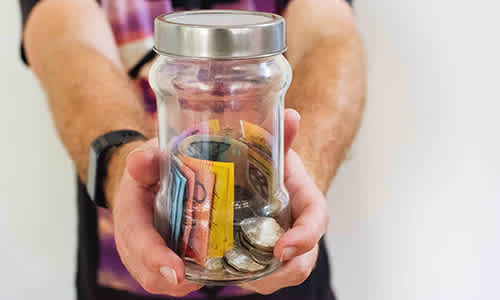What the 2021-22 Federal Budget means for your money

The Federal Government handed down its 2021-22 Budget recently, bringing with it a string of measures aimed at boosting the economy after the year that was.
From tax cuts to childcare subsidies, superannuation reforms to first home-buyer support, the 2021-22 Budget is likely to impact your hip pocket in some way.
It's important to note, while the measures are touted to start from 1 July 2022, they're not final. At the moment, they're just proposals; the Federal Parliament will need to make these measures law before they can come into effect.
What does the 2021-22 Budget mean for my tax?
Income tax offset
Get ready for another tax boost!
The Government has extended the one-off tax offset for low-and middle-income earners into the 2021-22 financial year.
The offset is available to taxpayers earning up to $125,000.
If you earn between $48,000 and $90,000, you're eligible for the maximum offset of $1,080. If you're part of a dual income couple, you're eligible for an offset of up to $2,160.
Just remember, it's not a lump sum payment. Instead, you'll pay less tax over the course of the financial year.
What does the 2021-22 Budget mean for my super?
The Minimum Super Threshold
In a big win for women, the Government has proposed to axe the $450-a-month minimum super threshold. Currently, employers aren't required to make super contributions if employees are earning less than this amount per month.
The threshold means around 300,000 Australians (63% of which are women) are losing out on super contributions. Under the scheme, employers would be required to make super contributions on every $1 earned by an employee from 1 July 2022.
This will go some way to closing the super gap between men and women at retirement.
The Super Guarantee
While this wasn't explicitly part of this year's Budget, the Government didn't reveal any blockers to the planned Super Guarantee (SG) increase, which was previously legislated.
The SG, or the guaranteed super contributions from your employer, is currently set at 9.5% of your base salary. From 1 July this year, the SG will increase to 10%, meaning more money in your super at retirement. It's all part of the Government's plan to eventually get the SG to 12% by 2025.
What does the Budget mean for parents?
Childcare rebates
The Government pledged a whopping $1.7 billion towards improving childcare affordability by way of rebates for parents.
However, it only applies to children under 5 years old, and only if you have two children in care at the same time.
In practice, it means from 1 July 2022, if you have two kids in childcare, your rebate for the younger child will increase by up to 30%, to a maximum of 95%. Again, this is only while both children are in care. Once one child hits primary school, the rebate reverts back to normal.
This is expected to save families with two children in childcare up to $125 a week in fees. That's $125 back in your pocket for groceries, bills or loan repayments!
Rebate cap
The Government is also planning to axe the childcare rebate cap, which often sees high income earning families cop the full cost of childcare once Government subsidies reach the ceiling.
The current cap means families earning between $189,390 and $353,680 pay the full cost of childcare, once they have received $10,560 from the Government.
If it becomes law, the cap will be removed from 1 July 2022.
What does the Budget mean for property?
The Family Home Guarantee
Under this proposal, single parents will be able to purchase a home with just a 2% deposit. The Government will guarantee the remaining 18%, and the buyer won't need to pay Lenders Mortgage Insurance.
This scheme is open to both new and existing homes, and it doesn't need to be your first home.
However, there are only 10,000 places available under the scheme - and these are spread out over four years. That means only 2,500 Aussies can apply for the scheme each year.
To be eligible for the scheme, you need to earn less than $125,000 per year, be an Australian citizen, and be over 18.
The First Home Super Saver Scheme
Saving for a house deposit can be tough, particularly when savings rates are so low. However, the First Home Super Saver Scheme (FHSSS) allows Aussies to make voluntary super contributions (before or after-tax), and later withdraw these funds for their deposit.
This means you benefit from investment returns on your money, which are generally higher than savings rates.
Currently under the FHSSS you are only allowed to contribute up to $30,000 to put towards your home. Under the Budget, the Government is proposing to increase this to $50,000 from 1 July 2022.
What does the Budget mean for my business?
Corporate tax rate cuts
From 1 July, businesses that are classified as a 'base rate entity' will see their corporate tax rate reduced to 25% from 26% last financial year.
To be a base rate entity, your business needs to turnover less than $50 million per year.
Temporary full expensing measures
Temporary full expensing measures were introduced by the Government in the 2020-21 Federal Budget, to lift the claim limit on depreciating assets for business owners for assets ready to use by 1 June 2022.
These measures are like an extension of the instant asset write-off scheme, which allowed businesses to claim a tax deduction on the business portion of the cost of eligible depreciating assets, like machinery or work vehicles, if they cost less than $30,000. This price limit was extended to $150,000 during COVID-19, but reverted back to $1,000 as of 1 January 2021.
The temporary full expensing laws have the same function, but there's no limit on the price of the asset. These measures were extended again in the 2021-22 Federal Budget to include any assets first used, or installed ready for use, until 30 June 2023.
What does the Budget mean for my budget?
To recap, the Government is giving you tax breaks, childcare rebates, home loan help and more super. These measures give you a little more leeway when it comes to budgeting.
For example, on a salary of $90,000, an extra 0.5% equates to $450 more in your super each year. If you're already contributing a little more to your super, you may want to consider whether you need to do that after 1 July 2021, or whether you have some pressing debts you want to pay off instead.
If you're eligible for the full $1,080 tax offset, you could consider whether you should add that amount to your savings, or put it towards some bills you may be behind on.
This is particularly important if you're applying for any loans in the future. Remember, lenders will check your credit score when you make an application for finance, and bad debts can often lead to a not-so-good credit score.
If you're not sure what your credit score is, you can check it for free here at SocietyOne. Our credit score report will provide you with powerful insights, to see how banks and lenders view your score.
Important: This page provides general information only and does not take into account your individual objectives, financial situation or needs. You should seek independent, professional tax advice before making any decision in relation to the information presented above. The Australian Taxation Office also has resources available at www.ato.gov.au/Individuals.
SocietyOne is not a registered tax (financial) adviser under the Tax Agent Services Act 2009 and you should seek tax advice from a registered tax agent or a registered tax (financial) adviser in relation to any liabilities or obligations or claim entitlements that arise, or could arise, under a taxation law.
Published on 2021-05-14T00:00+11:00
You may also like
News, tips and offers straight to your inbox.


